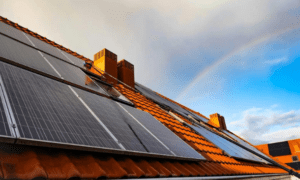As climate change and environmental responsibility continue to shape our world, sustainable practices are more important than ever. In part, this involves the growing need for renewable energy, as demonstrated by the surging demand for solar panels in the last decade. However, once a solar panel reaches the end of its lifespan, it needs to be properly disposed of, and the ability to properly recycle solar panels becomes critical to minimizing waste and maintaining the sustainability of solar.
The Importance of Sustainable Practices
Sustainable solar panel recycling is the reclamation of valuable materials from decommissioned or damaged solar panels, such as silicon cells, aluminum frames and glass. By recycling these materials, we minimize the environmental impact of solar even before it has become widely mainstream, and we retain highly valuable resources that have a big future in clean power. It’s worth noting the distinction here between recycling and reusing solar panels. Some forms of reuse may be practical in some circumstances, but recycling is the more sustainable option, in that it separates and reconstitutes valuable materials.
In order to understand why solar panels need to be recycled, let’s start with understanding how they work and how long they last.
One of the most significant benefits of recycling solar panels is waste reduction. Solar panels contain valuable materials like silicon, aluminum, and glass. By recycling these components, we can reduce the need to extract and manufacture raw materials and help diminish the volume of materials ending their life cycle in landfills.
Regulations and Guidelines for Solar Panel Recycling
In order to ensure that solar panel recycling is conducted in an environmentally responsible manner, a number of regulations and guidelines have been established. These regulations vary by country and region, but are designed to reduce the environmental footprint of solar panel disposal and to ensure that obsolete panels are safely and environmentally recycled.
Government agencies and other organizations are also actively involved in the oversight and promotion of solar panel recycling. These entities typically develop guidelines, offer resources, and enact regulations that ensure solar panels are recycled in a safe and sustainable way. Examples of these organizations include the U.S. Environmental Protection Agency (EPA) and the Waste Electrical and Electronic Equipment (WEEE) Directive of the European Union.
It’s so important to follow the regulations and guidelines for proper disposal of solar panels, as improper disposal can have significant impacts on environmental pollution and human health. So, make sure you know the regulations in your area and partner with a good recycler of used solar panels to ensure responsible recycling.
Finding A Solar Panel Recycler
When it comes time to recycle your solar panels, you need to find a good recycler near you. Luckily, there are resources available to help you do that. For one, the Recolight website offers a directory of registered solar panel recyclers, which you can peruse here. Additionally, you can glean some great information on possible recyclers from government websites and local waste management agencies in your area. In selecting a solar panel recycler, there are a few key elements to keep in mind. Of course, you’ll want to make sure that any recycler you choose follows all the regulations and guidelines for responsible recycling and that they are properly certified. For example, look for a recycler who has received the ISO 14001 certification, which demonstrates their commitment to environmental management practices. You’ll also want to consider a solar panel recycler’s experience and history, when making your selection. Finally, find out more about any recycler’s recycling process and technologies, to ensure they’re using environmentally-sound practices to do the job.
Consumer resources can be invaluable when you’re trying to find out more about how to recycle solar panels.Websites, blogs, and forums devoted to solar panel recycling inform your recycling efforts. You’ll find tips, information on any local regulations, and stories from other individuals who have recycled their solar panels.
However, there are steps you need to take before you send your solar panels to be recycled. Following through on any required maintenance ensures your solar panels are in the best condition to be recycled. Additionally, cleaning them and ridding them of any dirt and debris can help to make the recycling process more effective.
For example, there are certain things you should do before you send your solar panels to be recycled. As an example, you may want to contact your recycler ahead of time to know their requirements. This may include their stipulations for packaging your solar panels or how they need you to arrange for transportation. In order to avoid them being damaged in such a way that could deter the solar panel recycling process
Most of the time, the solar panel recycling process has a few steps. The solar panels will typically be disassembled first, so each material (silicon cells, aluminium frames, and glass) can be separated. Next, each material will be processed separately in order to extract any valuable components.
Several factors can influence the recycling process for solar panels, including their type, age, and the condition of their materials. Different technologies, such as monocrystalline or polycrystalline panels, require different recycling approaches because they have varying material constructions. As older panels start to go through the recycling process, valuables may be harder for recyclers to extract efficiently. Damaging or weather-exposed panels may also require different processes to obtain any value or present difficulties in recycling.
Solar panel recycling can also rely on a range of technologies. Mechanical processes—like crushing and shredding—break panels into smaller components, while chemical processes—like etching or leaching—extract valuable materials from them. These might include silicon, aluminum, and glass that can be used in creating new products or sold to manufacturers.
Recycled Panels’ Reuse Potential
By decommissioning old solar panels, valuable materials can be recovered and utilized again. Moreover, the panels themselves may find repurposing opportunities. For example, they can be utilized for off-grid systems, educational purposes and garden lights, which only scratch the surface.
Repurposing solar panels can ensure a multi-decade lifespan with predictable output, preventing them from becoming waste. The rapid advancement of technology also creates opportunities for recycling solar panels in unique ways. For example, solar wall and solar tile integration is just a Brooklyn rooftop away and manufacturers may chop up solar panel cells for art installations. In other words, solar panels may be efficient. These days, they’re also hip.
Recycling Solar Panels: Incentives, Systems
There are several incentives and advantages to recycling solar panels. A number of recycling facilities offer buyback programs, which may be enticing to individuals or businesses looking to dispose of their panels. Here, financial incentives exist, as they do for keeping materials like aluminium and silicon out of landfills. Moreover, by recycling valuable materials, the cost of manufacturing new solar panels may decrease.
And as is generally the case with recycling, tax credits and incentives also exist to promote solar panel recycling. In certain parts of the country, individuals or businesses can receive tax credits or rebates to responsibly recycle their solar panels. These tax credits and incentives exist to promote sustainable, environmentally friendly practices and reduce the environmental impact of solar panel disposal.
Conclusion
All things considered, solar panel recycling offers extensive environmental and social benefits. By recycling panels, we can reduce the need to extract raw materials, limit the waste in our landfills, and prevent the release of potentially hazardous materials into our environment. Additionally, responsible recycling principles help us create a sustainable, circular economy.
In the big picture, recycling solar panels is one of many vital practices for a sustainable future. By learning how solar panel recycling works, about the regulations and guidelines, and finding a reputable recycler, we can help ensure that valuable materials are recovered and reused and pollution and waste are minimized. The reuse potential of recycled panels and the incentives and benefits that come with recycling further justify the case for responsible solar panel recycling.
By taking on responsible solar panel recycling, we can do our part to contribute to the circular economy and help limit the environmental effects of solar panel disposal. Let’s all thread a little lighter by making sustainable choices and embracing solar panels as we work toward making our world as healthy and green — on the ground and in the air — as possible.



































